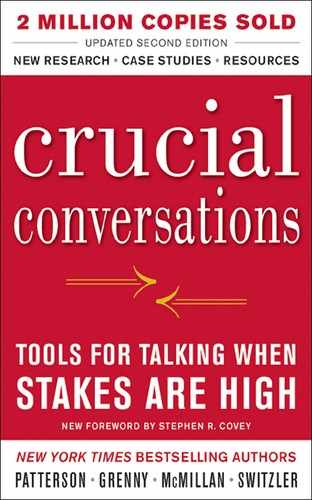DECIDE HOW TO DECIDE
Both of these problems are solved if, before making a decision, the people involved decide how to decide. Don’t allow people to assume that dialogue is decision making. Dialogue is a process for getting all relevant meaning into a shared pool. That process, of course, involves everyone. However, simply because everyone is allowed to share their meaning—actually encouraged to share their meaning—doesn’t mean they are then guaranteed to take part in making all the decisions. To avoid violated expectations, separate dialogue from decision making. Make it clear how decisions will be made—who will be involved and why.
When the line of authority is clear. When you’re in a position of authority, you decide which method of decision making you’ll use. Managers and parents, for example, decide how to decide. It’s part of their responsibility as leaders. For instance, VPs don’t ask hourly employees to decide on pricing changes or product lines. That’s the leaders’ job. Parents don’t ask small children to pick their home security device or to set their own curfew. That’s the job of the parent. Of course, both leaders and parents turn more decisions over to their direct reports and children when they warrant the responsibility, but it’s still the authority figure who decides what method of decision making to employ. Deciding what decisions to turn over and when to do it is part of their stewardship.
When the line of authority isn’t clear. When there is no clear line of authority, deciding how to decide can be quite difficult. For instance, consider a conversation we referred to earlier—the one you had with your daughter’s schoolteacher. Should you hold your child back? Whose choice is this anyway? Who decides whose choice it is? Does everyone have a say, then a vote? Is it the school officials’ responsibility, so they choose? Since parents have ultimate responsibility, should they consult with the appropriate experts and then decide? Is there even a clear answer to this tough question?
A case like this is hand-tooled for dialogue. All of the participants need to get their meaning into the pool—including their opinions about who should make the final choice. That’s part of the meaning you need to discuss. If you don’t openly talk about who decides and why, and your opinions vary widely, you’re likely to end up in a heated battle that can only be resolved in court. Handled poorly, that’s exactly where these kinds of issues are resolved—The Jones Family vs. Happy Valley School District.
So what’s a person to do? Talk openly about your child’s abilities and interests as well as about how the final choice will be made. Don’t mention lawyers or a lawsuit in your opening comments; this only reduces safety and sets up an adversarial climate. Your goal is to have an open, honest, and healthy discussion about a child, not to exert your influence, make threats, or somehow beat the educators. Stick with the opinions of the experts at hand, and discuss how and why they should be involved. When decision-making authority is unclear, use your best dialogue skills to get meaning into the pool. Jointly decide how to decide.
